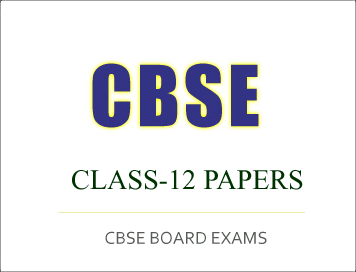CBSE Class-12 Question Papers for IOP/Comptt Examination 2017 : All India Scheme, Sociology
Disclaimer: This website is NOT associated with CBSE, for official website of CBSE visit - www.cbse.gov.in
CBSE Class-12 Question Papers for IOP/Comptt Examination 2017
All India Scheme, (Sociology)
CBSE Class-12 Question Papers for IOP/Cmptt Examination : Sociology
SOCIOLOGY
Time allowed : 3 hours
Maximum Marks : 80
General Instructions :
(i) There are 25 questions in all.
(ii) All questions are compulsory.
(iii) Questions no. 1-14 are short answer type questions carrying 2 marks each. Answer to each question should not exceed 30 words.
(iv) Questions no. 15-21 are long answer type questions carrying 4 marks each. Answer to each question should not exceed 80 words.
(v) Questions no. 22-25 are very long answer type questions carrying 6 marks each. answer to each question should not exceed 200 words. Question no. 25 is to be answered on the basis of the passage given.
1. Why is transition period associated with population explosion ?
2. Give the meaning of the term Laisse-z-faire.
3. State any two features of authoritarian state.
4. In what way Dalits are different from OBC’s ?
5. Give example how religious minority group suffer disadvantages ?
6. How did the planters live ?
7. Write the meaning of democracy.
8. How independent India retained a global outlook ?
9.In what way agriculture and culture are linked in our country ? Give example.
10. What do you understand by the term benami transfer ?
11. How circulation of labour led to more participation of women as agricultural labour force ?
12. Give the meaning of term disinvestment.
13. What is ‘alienation situation’ according to Karl Marx ?
14. In what way strike is different from ‘lock-out’ ?
15. State the reasons for the decline in the sex-ratio in India.
OR
There are wide regional variations in the age structure in India. Give reasons.
16. According to Alfred Gell, the market has significance much beyond the economic functions. Explain.
17. Explain how RTI Act makes the state accountable to the nation & its people.
OR
Why states are often suspicious of cultural diversity ?
18. Colonialism also led to considerable movement. Explain.
19. Examine the arguments given by Dr. Ambedkar and Mahatma Gandhi for the inclusion of Panchayati Raj in the Constitution.
20. State the common features central to the public perception of disability all over the world. Give example.
21. Discuss the various political changes which have hastened globalisation.
22. Explain tribal indentities in India with special reference to Jharkhand.
OR
Discuss the ways that strengthened the institution of caste in India under Colonial rule.
23. Discuss westernization as a process of social change in Indian society.
24. Bring out the changes that have been occurring in the Newspaper industry.
25. Read the passage given below and answer the following questions :
In our current information age, social movements around the globe are able to join together in huge regional and international networks comprising non-government organisations, religious and humanitarian groups, human rights association, consumer
protection advocates, environmental activists and other who campaign in the public interest. The enormous protests against the World Trade Organisation that took place in Seattle, for example, were organized in part through internet-based network.
(a) What do you understand by the term social movement ?
(b) What role does technology play to make social movement get globalized ?
Explain with example.
